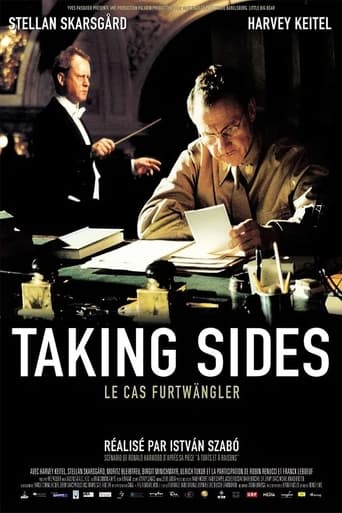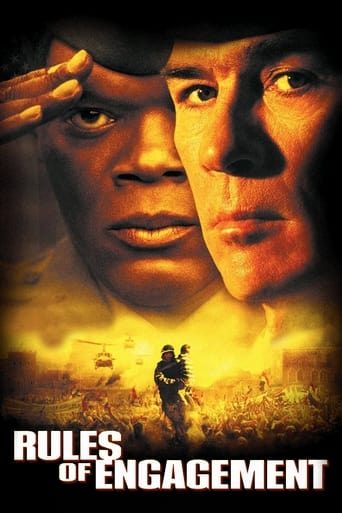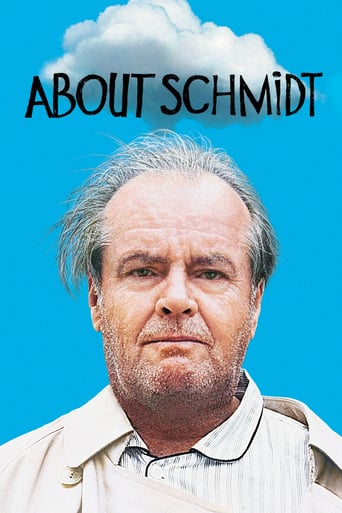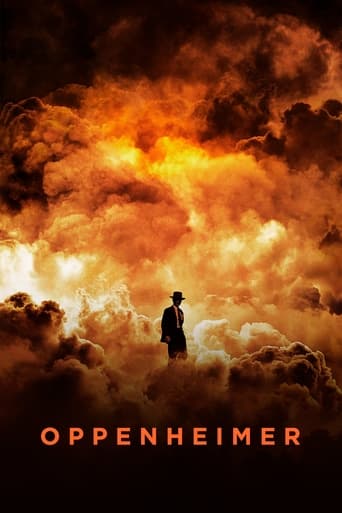


Taking Sides
One of the most spectacular and renowned conductors of the 1930s, Wilhelm Furtwangler's reputation rivaled that of Toscanini's. After the war, he was investigated as part of the Allies' de-Nazification programme. In the bombed-out Berlin of the immediate post-war period, the Allies slowly bring law and order to bear on an occupied Germany. An American major is given the Furtwangler file, and is told to find everything he can and to prosecute the man ruthlessly. Tough and hard-nosed, Major Steve Arnold sets out to investigate a world of which he knows nothing.
-
- Cast:
- Harvey Keitel , Stellan Skarsgård , Moritz Bleibtreu , R. Lee Ermey , Birgit Minichmayr , Ulrich Tukur , Oleg Tabakov


Reviews
Such a frustrating disappointment
hyped garbage
I cannot think of one single thing that I would change about this film. The acting is incomparable, the directing deft, and the writing poignantly brilliant.
A great movie, one of the best of this year. There was a bit of confusion at one point in the plot, but nothing serious.
An ignorant savage wrote "controversial conductor" about Wilhelm Furtwängler in the annotation to this page of the IMDb. Wilhelm Furtwängler had created not just an orchestra of a new vision of musicianship. Wilhelm Furtwängler had given to all people on Earth their identity of a civilized race. Nobody ever before or since had penetrated so deeply into the nature of music, the most sophisticated human creation. Nobody was able to enplane to us, humans what we are and what we can be so elegantly and clearly. But of cause we the listeners must make an honest effort to listen and try to understand. That is what the creators of the movie had done. I am thankful to them for their work that they had performed for me.There are two episodes in this movie that show us all in comparison to Wilhelm Furtwängler:1. A photograph showing Dr. Joseph Goebbels and Dr. Wilhelm Furtwängler talking to each other. A street bully, a thug Nazi and one of the most civilized and attractive humans who ever lived. 2. Wilhelm Furtwängler is trying to wipe his hand after a had shake with Goebbels while still bowing to the crowd of Nazis at their last concert in Berlin in April 1945.Both these Germans are the members of the same our human race. This film is a respectable effort to understand significance of Wilhelm Furtwängler.
Taking Sides plays out in the last days, for a solid forty-five years, of Germany's existence as a unified country the aftermath of World War Two, and it centres in on a fierce tryst between an American who is a bully; aggressive and enjoys vaudeville and that of a relatively humble German composer whose life had been dedicated to classical music; appears humble but is suspected of being a Nazi. István Szabó's film is a wonderful, mostly dialogue driven piece, which in spite of rarely getting out of the office belonging to that of its central American character, takes us on a gritty adventure as the fate of one man's life hangs in the balance and the reputation of another's hangs additionally so.The film begins with a quite wonderful depiction of a full orchestra playing a classical piece to a silent crowd, but as we track and weave our way around the majesty of the location within which they play, it becomes apparent higher members of Germany's Second World War era Nazi party are in attendance and are enjoying as much as we are – the film's soundtrack dipping in pitch as the reveal arrives. The idea of Nazism lurking amidst what is, on the surface, elegant and quite beautiful goes hand in hand with what the film essentially goes on to depict; specifically, the conductor orchestrating said performance and the apparent ties he has with the German party of said time in spite of the fact surface characteristics are what they are. The war will later end, with an air raid ruining this particular performance, and a number of unseen historical events unfolding throughout the world, as we know, go on to bring about the downfall of the Third Reich thus paving way for the arrival of the Allies and their setting up of base camps all over the ruined nation.Enter Harvey Keitel's American Major, Steve Arnold; a man charged with investigating those whose role in Germany's European reign of Fascism were often enough to make a difference but were often too what they were in their nature to occupy the proverbial radar. Arnold was an insurance investigator before the war, so investigative procedure and worming out the truth the man's speciality with these assets predominant in his life up to now. Whilst on the blunt end of a superior's exposition, he watches footage over an old projector of The Final Solution in action, although does not flinch; his entry to what will be his office for the remainder of his time in Germany timed with that of the American flag going up and a group of German children running over offering goods and services as if in some sort of debt – the guard is changing as is whom the predominant force are. He works with Birgit Minichmayr's Emmi and Moritz Bleibtreu's former soldier, David Willis; two people brought in on a secretarial basis but whose own bond actually comes to form a substantial an often softer, refreshing pit-stop alternative to the predominant office set berating.The man he's asked to interrogate and suss out the true one-time identity of is a composer named Wilhelm Furtwängler, played by Stellan Skarsgård. Furtwängler, being a composer, you might say is used to driving performances of his own; keeping cool when the centre of attention and generally doing a good job in controlling what's around him. Here, he will come up against someone who has already torn apart and done his job with a handful of Furtwängler's orchestra, thus must now rely on more than the fact he has already been cleared of Nazism under another jurisdiction. The members of Furtwängler's orchestra speak highly of him when interviewed by Arnold, and in a film all about the perception of someone and an individual's true nature, we recall the dishevelled and somewhat sleepy look of the man during that opening when he conducted through the air raid and wonder if their claims are indeed as authentic as they seem.Above all else, Keitel does a superb job with his role; a man who has often played unlikeable people but whose tales we find ourselves drawn toward - here, he plays a bit of a bully and a bit of a boor, but is essentially a member of an Allied force attempting to wedge out those guilty of the things we, the audience, freely observed earlier on in the found footage session as those responsible for rather shocking manoeuvres are sought out to be brought to justice. Keitel's role is somewhat reminiscent to that of what he did in Jane Campion's Holy Smoke, from two years previously, in that he is a big; brash; booming; charismatic all-American who's called into town to cause someone specific to 'crack' into reverting to what they were prior to, what superiors deem to have been, selling their soul. He, like everyone involved in the production, deserve praise.
Anyone who thinks this film is about the dilemma of whether art and politics should mix are completely missing the point.For me there are two major issues covered. The first being it is so easy to judge and be judgmental when you personally have not walked in the shoes of those you are judging. Keitel constantly passes comment on how those he was interviewing and investigating should have acted under the regime. But honestly, how many of you know for sure what they would have done? Sure we all would like to think we would stand up, but faced with the reality would we? We only have to see how propaganda in unjust wars in many countries have shown the populace to follow the sheep mentality, because it's not only easy, but none of us really want to accept that our country could be embarking on the road of evil.Secondly the way Keitel conducts his interviews surely mirrors the regime that the allied forces have just replaced. When Keitel is given his brief from his commander he is told to find a certain outcome before he has even read the notes on his target to shut up the 'Washington liberals' - but isn't liberalism the very thing that had been missing from Germany under the Nazi regime? Keitel constantly compares legitimate insurance practises with the Nazi style of administration. The conductor asks Keitel why another conductor (who was a Nazi Party member) was already allowed to work again when he was not and Keitel dismissed his question by simply saying 'but that's not your case'. A chilling example of how much of the modern world works.This film was a warning that we should be very careful not to become that which we loathe when we have the opportunity to change for the better.
One of the characters who understands best the great conductor Furtwängler who is the principal hero of 'Taking Sides' is the Soviet colonel Dymshitz. Dymshitz is a curator at the Hermitage museum in his civil life, and besides being a man of culture he also understands too well the compromises an artist must make in order to continue to survive as an artist and as a human being under a dictatorship.This is actually one of the central themes of the work of director Istvan Szabo. In 'Mephisto' and 'Hanusses' he was also dealing with the Nazi era, but by telling WWII stories the Hungarian director does nevertheless talk also about all dictatorships, or specifically the Communist rule he knew directly.The action of the film happens after the war, when Wilhelm Furtwängler, one of the greatest directors of the century stands on trial in a denazification tribunal for his cooperation with the Nazi regime. Despite many of the great musicians of the era he did not live Germany, he played for the Nazi dignitaries in Jews-free orchestras, and his opposition to the Nazi regime is unclear. He was not a Nazi party member, and he intervened to save lives of Jewish musicians, but yet was used a propaganda tool until the very end of the war.The balance of the movie lies in the balance of the superb acts of the two principal actors. Harvey Keitel plays the American prosecutor major Arnold, while Wilhelm Furtwängler is played by the Sweidish Stellan Skarsgård. Arnold is the opposite of Furtwängler in almost any plane. To his moral superiority enhanced (maybe not necessarily) by filmed reports from the death camps is opposed Furtwängler's ambiguity and doubts, but his rudimentary culture is no match for the European refinement of the director. Keitel gives a strong act, maybe a too strong one, as his rudeness opposed to the doubts and maybe remorse of the German seem to give to the musician a postume and probably not deserved absolution.The last scene shows Furtwängler living the building where the interrogation happened in the sounds of Beethoven's Fifth. The director switches to a real filmed concert with the same music, at the end of which Furtwängler shares hands with a Nazi dignitary (may have been Goebels, the Nazi minister of propaganda). The he is shown (twice, once in close plan) wiping his hand as in some kind of cleaning act. The question remains if a handkerchief is enough to clean somebody who shook hands with the Devil.










